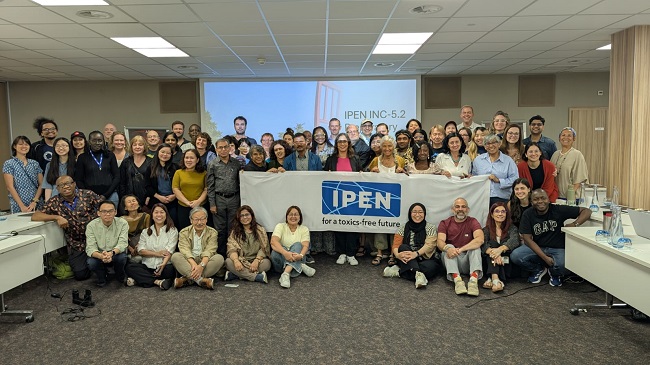Midway through the Plastics Treaty negotiations scheduled to end on Thursday August 14, 2025, the International Pollutants Elimination Network (IPEN), a global network of NGOs dedicated to the common aim of eliminating pollutants, has said that concerns for the threats to human health from toxic plastic chemicals are widely shared by delegates as momentum grows for a Treaty with global controls on harmful chemicals.
Over 80 countries, mostly members of the African Group of Negotiators, have endorsed a proposal by Switzerland and Mexico that outlines ways to protect human health from hazardous plastic chemicals through global controls.

After years of stalled negotiations with just few days left to agree on a strong legally binding instrument, the stocktake plenary on Friday, August 8, was deemed a critical moment for the INC-5.2 Chair and Member States to turn things around by calling for a vote, in order to forestall the consensus-based decision-making by a few big oil and plastics producing countries blocking the process.
However, while many high ambitious countries expressed frustration at the lack of progress, African region and its negotiators remain resolute and strong together on their demands.
“So far, the INC negotiation process is broken, we are currently in damage-control mode particularly the failure for a vote against consensus, which has continued to place plastic treaty process into uncertainty towards an ambitious landing zone and a strong Treaty,” said Dr Leslie Adogame, Executive Director of SRADeV Nigeria.
However, progress toward an agreement appears slow, primarily due to “obstructive tactics” by oil producing nations. These countries have allegedly manipulated the consensus process to block the majority of countries that favour a Treaty that includes protections for health and the environment.
IPEN and SRADeV Nigeria (IPEN participating organisation) have called for procedural changes that were adopted by previous multilateral environmental agreements to allow voting when consensus cannot be attained.
“It is worrisome that at this stage of the negotiation, members states are still stuck with over bloated text full of brackets, there remains more divergent views than anticipated convergence text at the final negotiations of the Treaty, it is time to break the procedural deadlock,” said Dr Adogame.
“As the negotiations continue, we urge delegates to remember the mandate: to end plastic pollution and protect human health and the environment, throughout the full life cycle of plastics,” said Yuyun Ismawati, IPEN Co-chair and Co-founder of Nexus3 Foundation in Indonesia.
“As plastic production is forecast to triple in the coming decades, the only way to meet this goal is through limiting plastic production and controlling toxic plastic chemicals. A meaningful Plastic Treaty is urgently needed to resolve the plastics crisis,” added Ismawati.
IPEN and its member organisation have declared support for the proposal from Switzerland and Mexico as a positive step toward protecting health and the environment from toxic plastic chemicals. The proposal calls for an article in the Treaty (Article 3) to outline how plastic chemicals that pose health, and environmental threats can be globally regulated.
The proposal is said to be consistent with other global conventions that have a track record of success in creating global controls on toxic chemicals, such as the Stockholm and Basel Conventions, and includes:
- A mechanism creating an initial list of hazardous plastic chemicals (“chemicals of concern”), with means for updating the list as new science on toxicity evolves;
- Methods for transparency and traceability of chemicals of concern in plastic products;
- Global, legally binding obligations.
While an important step, IPEN/SRADeV Nigeria notes the proposal could be strengthened with a broader focus that is not limited to plastic products but covers plastics as a material that creates toxic threats throughout its life cycle.
IPEN has expressed concern about the stalling tactics of oil-producing nations and procedural barriers that have blocked vital observers from participating meaningfully in many discussions. Scientists, Indigenous Peoples, labor sector representatives, and other stakeholders who have vital information and perspectives are said to have been denied access through closed-door discussions and inadequate meeting spaces.
“IPEN members from around the world bring the perspectives of those who are most directly harmed by plastics to the Treaty negotiations. The Treaty deliberations must be open and accessible to include these voices who know first-hand how toxic plastics can affect human health and the right to a healthy environment we all deserve,” said Pamela Miller, IPEN Co-chair and Executive Director of Alaska Community Action on Toxics (ACAT). “We stand committed to hold negotiators accountable for a Plastics Treaty that achieves the health protections we all need and deserve.”
